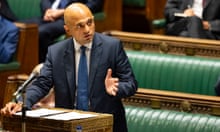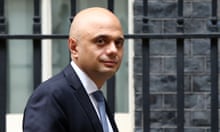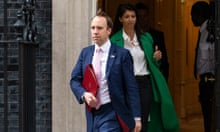Boris Johnson has set up an extraordinary confrontation with MPs when they return to Westminster next week by announcing that he has asked the Queen to suspend parliament for five weeks from mid-September.
The prime minister claimed there would be “ample time” to debate Brexit, as he wrote to MPs on Wednesday, saying he had spoken to the Queen and asked her to suspend parliament from “the second sitting week in September”. Later on Wednesday the Queen approved the order.
MPs will then not return to Westminster until 14 October, when he said there would be a new Queen’s speech, setting out what he called a “bold and ambitious domestic legislative agenda for the renewal of our country after Brexit”.
The effect of the decision will be to curtail the time MPs have to introduce legislation or other measures aimed at preventing a no-deal Brexit – and increase the pressure on Jeremy Corbyn to table a vote of no confidence next week.
If Johnson lost that vote, there would then be a 14-day period in which Corbyn, or an alternative candidate, could seek to assemble a majority. If no new government emerges, a general election would then have to be held.
But government sources insist Johnson is determined not to go to the polls before Britain is due to leave the EU. “We have been very clear that if there’s a no confidence vote, he won’t resign. We get to set an election date. We don’t want an election, but if we have to set a date, it’s going to be after the 31 October,” said a senior government source.
Asked if he was denying opposition MPs the time to stop a no-deal Brexit, the prime minister told Sky News: “No, that is completely untrue. We are bringing forward a new legislative programme on crime, hospitals, making sure we have the education funding we need.”
In the letter to colleagues, Johnson said MPs would be able to debate his approach to the EU negotiations before the European council on 17 October, at which any new deal would have to be agreed by the EU27 – and to vote on it afterwards.
This article includes content provided by Scribd. We ask for your permission before anything is loaded, as they may be using cookies and other technologies. To view this content, click 'Allow and continue'.
“Parliament will have the opportunity to debate the government’s overall programme, and approach to Brexit, in the run-up to EU Council, and then vote on this on 21 and 22 October, once we know the outcome of the council.
“Should I succeed in agreeing a deal with the EU, parliament will then have the opportunity to pass the bill required for ratification of the deal ahead of 31 October,” he said.
In practice, given MPs do not sit on most Fridays, they are only likely to lose between four and six sitting days in parliament, depending on which day parliament is prorogued on the second week of September. MPs would have been due to hold conference recess anyway, from 12 September until 7 October.
Leaked emails revealed at the weekend that Johnson had sought legal advice about proroguing parliament for five weeks from early September, when MPs are already expected to break briefly for party conferences.
Q&AWhat does 'prorogue parliament' mean?
Show
Prorogation is the official term that marks the end of a parliamentary session. After being advised to do so by the prime minister, the Queen formally prorogues parliament. This takes the form of an announcement in the House of Lords on the Queen’s behalf. It is a speech, written by the government, which usually describes the bills that have been passed during that session and summarises what has been achieved.
It means that all work on existing legislation stops, and MPs and Lords stop sitting. Prorogation also automatically kills any bills, early day motions or questions to ministers going through parliament.
Parliament can then be reopened a few days later with a fresh slate of legislation intentions, set out in a new Queen’s speech at the formal state opening of parliament.
On Wednesday morning, the Conservative chairman, James Cleverly, confirmed the move on Twitter, saying that planning to hold a Queen’s speech was something that “all new governments do”.
Or to put it another way:
— James Cleverly MP (@JamesCleverly) August 28, 2019
Government to hold a Queen’s Speech, just as all new Governments do. https://t.co/fgKSmLdOzb
Labour’s deputy leader, Tom Watson, called the move “an utterly scandalous affront to our democracy. We cannot let this happen.”
A meeting of opposition MPs, convened by Jeremy Corbyn, agreed on Tuesday to let legislative efforts take priority over a confidence vote in the new government as a mechanism to stop no deal – a priority that could be changed given the curtailing of the parliamentary timetable.
The proposed new timetable would leave MPs with a far narrower window to pass anti-no deal legislation, cutting it short by two weeks, with new dates likely to be:
MPs returning on 3 September.
A new spending review on 4 September.
Parliament prorogued before party conferences on 12 September.
Parliament returns for Queen’s speech on 14 October.
The EU council meets on 17 October, potentially to agree any new Brexit deal.
The UK would be due to leave the EU on 31 October.
Rumours swirled in Westminster on Tuesday that plans were afoot to stymie MPs’ efforts to stop no deal after it was revealed that Sajid Javid, the chancellor, would hold a fast-tracked spending review on the day after MPs return to parliament next week, promising a cash boost for schools, hospitals and policing..
The swift timing of the review came as the first major speech by the chancellor was abruptly cancelled by the Treasury with less than 24 hours’ notice.
A Treasury spokesman said the speech had been cancelled because the one-year spending review, called a spending round, which had been expected to take place later this autumn, was being fast-tracked.
Javid, writing in the Daily Telegraph, suggested he would not break his predecessor Philip Hammond’s strict fiscal rules, saying the government could “afford to spend more on the people’s priorities – without breaking the rules around what the government should spend – and we’ll do that in a few key areas like schools, hospitals and police.”
The chancellor said his economic priorities were health, education and policing, suggesting that other key areas including housing may get overlooked for major investment.
He said: “Health and education aren’t just the names of departments – they’re lifelines of opportunity, just as they were for me. The teachers who persuaded me that I had what it takes to study economics, and put me on the path to becoming chancellor of the exchequer.
“The police officers who kept us safe when the street I grew up on became a centre for drug dealers. The NHS that cared for my dad in his final days. These aren’t just numbers on a spreadsheet. They’re the beating heart of our country.”
The shadow chancellor, John McDonnell, said: “Nobody is fooled into believing that this is a proper and normal spending review. It’s a one off pre-election panic-driven stunt budget.
Whitehall sources suggested there was considerable concern MPs could trigger a vote of no confidence in the government and an early general election, which could lead to departments being left in the dark about spending plans, with budgets running out in 2020.
“We want people to be able to plan and there is a reason it is in early September because of the risks when MPs return to the house that week,” one source said.
The 12-month review, instead of the usual three-year review, is intended as a short-term measure to give departments new budgets and also free up officials to focus on preparing for Brexit.









